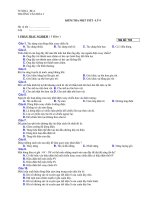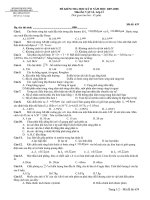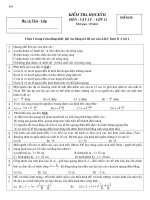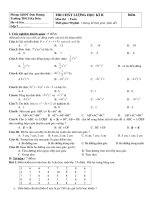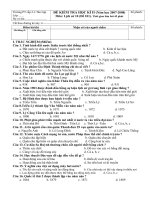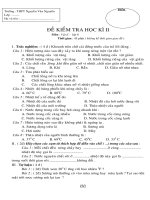Đê thi học kì II (hoài đức)
Bạn đang xem bản rút gọn của tài liệu. Xem và tải ngay bản đầy đủ của tài liệu tại đây (44.49 KB, 3 trang )
Phßng GI¸O Dôc vµ T¹o Hoµi §øc
The second semester test
Grade 9 School year – 2008 - 2009
Time allowed : 45’
Name : .………………………… ……………
Class : 7 ..……
Mark
Teacher’s remark
I. Choose the best answer :
1. If people ......... public transport, there will be less pollution.
a. use b. will use c. can use d. used
2.You used to lived in New York, ............... ?
a. don’t you b. used you c. did I d. didn’t you
3. She is laughing ............ because she has just earned a lot of money.
a. happy b. happily c. happiness d. happier
4. She missed the bus ................ she got up late.
a. although b. so c. but d. as
5. I’m pleased .............. you look a lot better today.
a. that b. when c. if d. with
6. How about going for a picnic this weekend ?
a. I suggest you going for a picnic this weekend.
b. Let go for a picnic this weekend.
c. I think we should go for a picnic this weekend.
d. Why don’t we going for a picnic this weekend ?
7. Her electricity was cut ............ when she didn’t pay her bill.
a. out b. of c. off d. down
8. A: That’s an excellent dress.
B: a. Thank. c. Of course. d. All right. b. It’s nice of
you to say
II. Use the correct word form :
1. The most (disaster) . earthquake in Japanese history damaged ……………
Tokyo.
2. The town’s (celebrate) ... will begin with a parade.…………………
3. The company must reduce costs to compete (effect) . ..………… ……………
4. Many household (apply) .. are expensive to run.…………………… …
III. There is one mistake in each sentence. Find the letters and
correct them:
1. Hurricane Andrew, that swept through southern Florida in 1992, killed 41
people.
A B C
2. The bike that I bought it last week is very expensive.
A B C
3. When her dog died , she cried very hardly for half an hour.
A B C
4.Despite Thuy’s grandma never trusts weather forecasts, she likes
watching them.
A B C
IV. Rewrite each sentence so that it has the same meaning as the
first :
1. Jone is Jane’s brother. He sat beside you at the party last night. (who)
.................................................................................................
2. The house is empty now. She used to live in it. (which)
...................................................................................................
3. The forecast said it would rain. It turned out to be a beautiful day. (though)
.....................................................................................................
4. Simon couldn’t come to the meeting. He was busy. (therefore)
.......................................................................................................
5. I told the truth. No one would believe me. (however)
.........................................................................................................
6. Why don’t you spend your vacation in Ha Long Bay? (I suggest)
............................................................................................................
V. Read the passage then answer the questions below:
In Britain there is a holiday now which people call Mother’s Day. In
the old days, many girls from working-class families in towns and cities and
from farmers’ families in the country worked in rich houses. Once a year, it
was usually on Sunday in March, they could visit their mothers. They went
home and brought presents for their mothers and for other members of their
families. People called that day Mothering Day or Mothering Sunday. Later
workers at the factories and girls who worked in the houses of rich families
received one free day a week and Mothering Day became Mother’s Day. It is
the last Sunday in March.
1. Where did many girls from working- class families in towns work in the old
days ?
........................................................................................................................
............
2. When could they visit their mothers?
........................................................................................................................
............
3.What did they bring home for their mothers?
........................................................................................................................
............
4. When do people in Britain celebrate Mother’s Day?
........................................................................................................................
............



